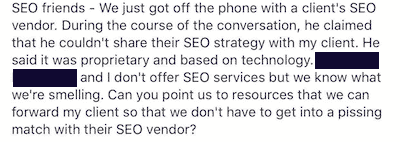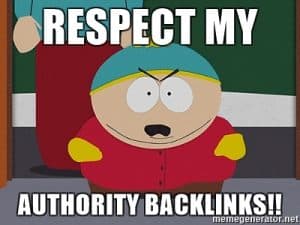…But I won’t tell you my strategy, because its proprietary…
This post appeared in my FaceBook feed, and sparked some discussion:

From the outset, lets be perfectly clear, there is no SEO strategy worth engaging with that you shouldn’t, or can’t share with clients.
If your agency, consultant, or SEO specialist is telling you this, you are being conned.
It’s that simple.
SEO is Not a Mystery

All of these services scams rely on one simple factor – most people fundamentally don’t understand how search engines work. That provides opportunity to introduce fear, uncertainty and doubt.
We accuse Google of this all the time, but the SEO industry is if anything, worse.
I’m not saying understanding all of SEO is straightforward, Google is a complex beast, with hundreds of potential factors that influence your ranking, and navigating those is a specialists role.
While it is complex, that’s not to say it’s not easy to understand the fundamentals that all sites are ranked by: on-site technical SEO, content & authority.
Every single thing we do as SEO’s falls into one of those three very broad categories:
SEO Can be Explained Simply
 On Site / Technical SEO boils down to making your website easy for Google to crawl, and understand.
On Site / Technical SEO boils down to making your website easy for Google to crawl, and understand.
Content that appears on your website must be worthwhile, relevant, interesting and adds value to Google’s index.
Authority, which you can call PageRank, backlinks, link equity or any number of other terms, is the primary way Google sorts their results.
While each of those three things may have hundreds of factors to consider, that’s it:
There is no fourth category only revealed to the illuminati.
There is no secret handshake with Google engineers.
There is no “Secret Sauce“.
But Our Secret Methods Have Demonstrated Results!
I’m not implying here that you can’t get results by doing things in SEO, that can damage your website long term.
You can, and you could see those results quite quickly, here’s some likely candidates as to what might be going on:
On-Site / Technical
It’s going to be pretty tough for anyone to apply “secret technology” to your on-site SEO, as inherently you’re going to know whats being done on your own site, or at least be able to work it out by comparing old vs. new.
All modern crawler software can assist you in finding on-site issues, and making suggestions on how to fix them.
Knowing what will have the highest impact, what is irrelevant to your situation, and what order to do them in, is the artistry in Technical SEO, and any search expert will be able to guide you through those hurdles.
Content
 Content can be a different matter though, in my personal experience, many people have pitched me their “top secret” content technology, which is always pretty much a variant on what we used to call Spamdexing or Doorway Pages.
Content can be a different matter though, in my personal experience, many people have pitched me their “top secret” content technology, which is always pretty much a variant on what we used to call Spamdexing or Doorway Pages.
Basically, filling your site up, either using a subdomain or a reverse proxy subfolder, with hundreds, or even millions of pages targeting long tail keywords using autogenerated content.
The vendors always try to dress this up along the lines of “we know what Google is looking for based on our programmatic keyword research, and we fill the long tail need by creating pages tailored towards these queries” (actual quote from a company that pitched me recently).
Let’s be honest, this approach worked amazingly well for a long time, but it was a problem for search engines as they fundamentally don’t want to return a rubbish page of content even if it was really well targeted at a search phrase.
That’s why Google Panda is a thing, remember when we called it the Farmer Update? That was because it was designed to target low quality content farms, and that’s precisely what this approach is.
It can work in a limited sense to this day, but it’s introducing an un-necessary level of risk, and not knowing about that risk, or having someone hide it from you, is a very worrying situation.
Authority
 Most of these scams fall into the backlink, or PageRank category, and its often the hardest to see.
Most of these scams fall into the backlink, or PageRank category, and its often the hardest to see.
Of all the levers you can pull as an SEO, building a large amount of links passing equity to a page on your website is normally the easiest way to ensure positive rank changes. Google PBN Services and you’ll see dozens of companies offering this exact service.
Ten years ago, you could also get away with doing this with practical impunity – Google were very reserved with any penalties back then, and as an industry we turned building links into a dark-art.
The long term problem with that approach however was that we managed to manipulate the results to such an extent (sorry, I should take some of the blame) that Google simply had to take action by penalizing sites, which had rankings artificially boosted by these spammy links.
Enter stage left: The Penguin Update.
What do I do if my SEO provider refuses to tell me their methods?
 The answer here is simple: fire them. Immediately.
The answer here is simple: fire them. Immediately.
No amount of short term gain is worth potentially ruining your online presence indefinitely.
Fully understanding the risks, and deciding to execute on them is one thing, but the reality is most people don’t understand.
Most just see a polished sales pitch, have incredible growth figures or projections thrown at them, with offers of quick results at low cost. I’m yet to see one of these pitches mention the likely long term penalty though.
That’s why these methods are kept “secret”, because if you knew the risks, you’d run for the hills. Rightfully.
Why Keeping Secrets is Bad Business
There’s only two reasons I can see for an SEO to hide what they’re doing for their clients:
- It’s risky, and they haven’t divulged the risk.
- They are concerned that showing clients what they do, may enable the clients to do it themselves.

If you’re legitimately concerned that clients will take your advice, and implement them on their own limiting your future earnings, you’re in the wrong business.
The best possible outcome for any SEO, whether they be consultants, agencies, freelancers or in-house, is to educate those around us what best practices are, and ensuring that people stick to them.
There is easily enough specialist knowledge and experience that SEO practitioners should have to remain useful to their clients or employers.


